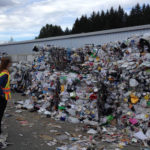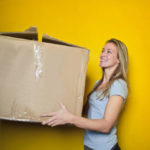Why Can’t I Recycle Wet Cardboard?

Why Can’t I Recycle Wet Cardboard?

I used to wonder why I would always see warnings about cardboard needing to be clean and dry for recycling. The clean part I understood. It makes sense that dirty cardboard soiled with oils, food or just plain dirt would contaminate that load and make it difficult to recycle. But can you recycle wet cardboard? After all, recycled paper products are going to end up in water to break them down into a paper slurry anyway, right?
Well, it turns out that there are several important reasons why you don’t want your cardboard to get wet before it goes to the recycling center. First of all, you need to understand a little bit about how the recycling process works.
How Cardboard Gets Recycled
If you are recycling cardboard at home, most likely you have one curbside bin for mixed recyclables (single stream recycling). The contents of those bins get picked up and trucked off to a Materials Recovery Facility (MRF). Once at the MRF, the mixed materials have to be separated into paper, plastic, metal and glass so that they can then be sent on to manufacturers who can process them into new materials.
The way the paper and cardboard are separated from the other materials is to pass them along a conveyor belt system that bounces everything, causing the lighter stuff (the paper and cardboard) to “float” to the top and be separated off. If the paper and cardboard are wet and mushy, this doesn’t work. Not only do they not separate properly, they may gunk up the works and get caught in the spinning discs.
More Reasons Why You Don’t Want to Recycle Wet Cardboard
If you are a business that bundles your cardboard and sends it directly to a paper manufacturing or recycling facility, it still needs to be dry. The cardboard is weighed to determine what it is worth. Wet cardboard is much heavier than dry cardboard and no paper manufacturer wants to pay for water. They usually won’t accept it unless it is dry.
On top of that, paper fibers change when they become wet. Have you ever had a box get completely soaked and then it dried out, but it was never the same? Cardboard may become brittle and even crumbly after getting wet. Water weakens the paper fibers, making cardboard less valuable.
One more reason to keep your cardboard dry: wet cardboard tends to become moldy pretty quickly and mold is a contaminant in recycling. Moldy cardboard should NOT be recycled.
Can you recycle wet cardboard ever? If you can dry it out and it’s not moldy or crumbly, then it’s probably okay to recycle it.
Cardboard Recycling Tips

- Break down your boxes and make sure that they are clean and free of any styrofoam and so on.
- Flatten them out and make sure that they fit completely in your bin (so they don’t get rained on). You may need to cut them down if they are really large to get them to fit. Some communities may allow you to leave them outside the bin, but don’t leave them in the rain.
- You don’t need to worry about tape and labels, they can be left on.
- Leave out dirty, moldy or food-soiled boxes (like pizza boxes). Compost them instead! (Unless they are contaminated with chemicals or toxic substances!)
- If you have a box that has gotten wet, let it dry out, and if it is clean and not moldy, you can recycle it (although it’s best to try not to let boxes get wet in the first place).
Did you know?
Corrugated cardboard is the highest grade of paper and therefore one of the most valuable recycling materials. Most of your recycled cardboard goes back into making new cardboard, paperboard or chipboard. Making 1 ton of virgin cardboard requires 3 tons of trees. Recycling 1 ton of cardboard eliminates 9 cubic yards of landfill space!*
* Reference: Earth911.com






Thanks for explaining how wet cardboard won’t float to the top when on the conveyor belt to get recycled. I don’t recycle cardboard because I didn’t know what was okay and what wasn’t. Now that I know I just need to avoid putting in wet cardboard I’ll start to recycle it more often.
Great, thanks, Chris!
I am confused. I think all recycled paper go into a big machine called Hydrapulper which actually wets the the recycled items and blends them to separates the paper pulp which is then used for other paper materials. Do I have it wrong?
Hi Ophir, yes the cardboard does get wet once it goes through the remanufacturing process, but the manufacturers want it to stay dry before that, for all the reasons mentioned above.
I know you can donate cardboard on BoxGiver. Hope this helps!
Great tip, thanks!